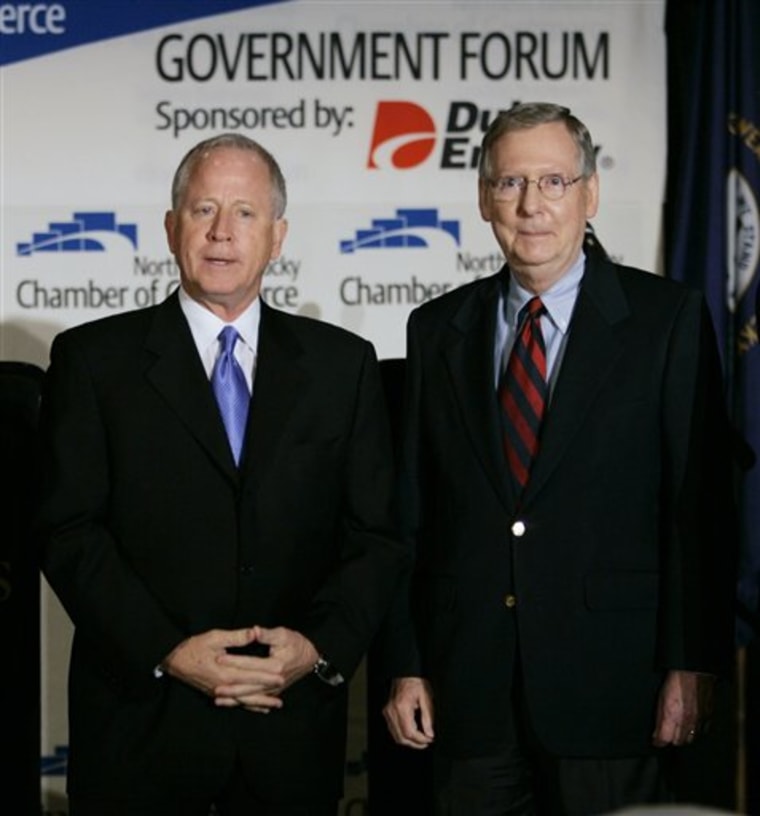Jeff Fuller was in a rebellious mood during a parade winding past a nearby Confederate monument on the town square.
The Republican confided that he might vote for someone other than the GOP stalwart in a red convertible at the head of the procession — Senate Minority Leader Mitch McConnell.
The reason he was leaning toward his first-ever Election Day defection to a Democrat: McConnell's support for the $700 billion government rescue of the financial industry.
"The Republicans have gone against what they fundamentally stand for," Fuller said. "I own my home and if I get behind on my payments I don't expect you to bail me out."
For two decades, McConnell has readily beaten a series of Democratic challengers, including current Gov. Steve Beshear in 1996, by matching GOP voters like Fuller with conservative Democrats who vote their party in local races but often support Republicans in federal elections.
This year, some might not.
In his bid for a fifth term, McConnell is locked in a tough fight with Democratic challenger Bruce Lunsford, a millionaire businessman who is taking advantage of the turmoil in the economy while linking the senator to an increasingly unpopular President Bush.
"He's been a yes-man and a lap dog to George Bush. And the policies the two of them together have implemented have failed across the board," said Lunsford, a former corporate chief executive and two-time election loser now trying to pull a stunning upset of the man who's become the face behind a forceful GOP Senate minority in Washington.
McConnell helped push the rescue package through the Senate and has defended the taxpayer-funded plan back in Kentucky, calling it "the beginning of the way back" for the faltering economy.
Lunsford, who ran for governor in 2003 and 2007 but never got out of the Democratic primary, has said he would have been "hard-pressed" to vote for the rescue plan.
Mark Stratton, a paint contractor among the crowd at the southern Kentucky parade, supported the plan, worrying the economy could "go under" without government intervention. Stratton, a Democrat, said he supports McConnell.
"With the way our economy is right now, I don't think it's a good time for change," he said. "We need somebody who knows the ropes."
Stratton is the type of Democrat McConnell has relied on in the past. Of Kentucky's 2.9 million voters, 57 percent are Democrats and about 36 percent are Republicans. Bush won the state with nearly 60 percent of the vote in 2004. Independents and members of third parties make up only 7 percent of the state's electorate.
Democratic strategist Kim Geveden said Lunsford has made some inroads with conservative Democrats in the western part of the state as the economy took its toll on McConnell. "If it wasn't for the economy, this race would have been over. But we do have this economy and the race isn't over," Geveden said.
McConnell, part of a Washington power couple with his wife, Labor Secretary Elaine Chao, realizes that being the Senate's top Republican has made him a bigger target but is confident he'll win re-election.
"I've got enemies who didn't know who the heck I was a few years ago from all over America, who don't believe in our way of life," he told supporters in Russellville, a farming town about 15 miles north of the Tennessee border. He said he started bracing more than a year ago for a tough campaign as Bush's popularity declined.
Asked what's making his latest re-election campaign so difficult, McConnell said, "The times are more difficult."
A late September poll for The Courier-Journal of Louisville showed McConnell and Lunsford each drawing support from 41 percent of likely voters. Another poll published by the newspaper found that Republican presidential nominee John McCain would get the support of 53 percent of likely voters in Kentucky compared with Democratic nominee Barack Obama's 41 percent.
Joe Gershtenson, a political scientist at Eastern Kentucky University, said Lunsford has a shot, but "when push comes to shove, I would still have to give a little bit of a nod to McConnell."
McConnell has tried to turn the focus on Lunsford with TV ads focusing on his millionaire lifestyle and ties to Valor Healthcare, which provides care to veterans. Lunsford is a former Valor CEO and a member of its board of directors.
One of those ads might have backfired when a featured veteran later appeared in a Lunsford commercial claiming McConnell's campaign took his words out of context.
Democrats have hit back with ads linking McConnell to the economic meltdown by supporting financial deregulation while accepting millions in campaign contributions from Wall Street interests.
Among the throngs gathered recently for the annual Tobacco and Heritage Festival in Russellville, the focus was on the economic meltdown and the financial rescue plan.
Tim Taylor, a Democrat who supports McConnell, seemed willing to give him the benefit of the doubt on the rescue plan vote while praising the senator as a strong ally of Kentucky farmers.
"They had to do something," he said. "Whether it's the right thing to do or not I'm not sure."
Lemuel Palmer, a Democrat, backed McConnell in the past but now supports Lunsford simply because he's "the new guy."
"I think we need to clean everybody out," Palmer said before climbing into a pickup truck to pull a parade float. "Every incumbent ought to be voted out and put somebody else in."
Walter Baker, a former Republican state senator, said voters disgusted with the economy could "take it out on any and all Republicans." He said the president's unpopularity adds "baggage" to McConnell's campaign.
"I still think McConnell will squeeze through, but it could make it a much, much closer race than any of us ever expected it to be back in January," he said.
